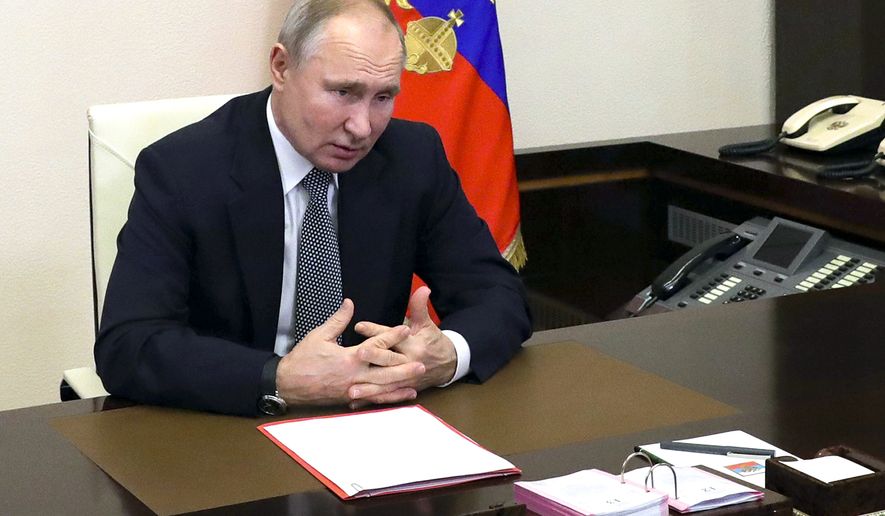President-elect Joseph R. Biden’s foreign policy to-do list just got a little longer after Russia announced late last week with was following the Trump administration’s lead and withdrawing from the multinational Open Skies Treaty designed to lower suspicions and improve transparency on both sides of the old Cold War divide.
The incoming administration already faces pressing policy decisions regarding Russian on the soon-to-expire New START arms control treaty and the soon-to-be-completed Nord Stream 2 oil pipeline with Germany.
Russia’s Foreign Ministry said the U.S. formal withdrawal in November from the Open Skies Treaty, which allows participating nations across Europe to conduct unarmed surveillance flights over other signatories, had “significantly upended the balance of interests of signatory states.” Among Russia’s complaints was that U.S. allies still in the treaty refused to guarantee information they gleaned from Open Skies flights would not be shared with Washington.
Moscow unsuccessfully sought guarantees from NATO allies that they wouldn’t transfer the data collected during their observation flights over Russia to the U.S., The Associated Press reported.
Mr. Biden’s team still has a little time: Russia’s parliament will now have to ratify the withdrawal and Moscow would still face a six-month notification period before formally pulling out.
The Trump administration last year announced its intent to leave the 20-year-old treaty, maintaining that Russia was violating the treaty and it is no longer in the U.S. national interest. American officials long complained about restrictions Moscow has put on overflights of certain areas, including Chechnya and Russia’s strategic Kaliningrad enclave in Europe.
The Pentagon and U.S. intelligence agencies also warned Moscow used Open Skies flights over the U.S. and Europe to map out targets and infrastructure that could be hit by a conventional or cyberattack.
Supporters of the treaty have argued that withdrawal would prove a burden to European allies who still supported the agreement. All but two of the European Union’s 27 countries are part of the agreement and when the U.S. conducts intelligence flights, European allies are often brought along.
Mr. Biden, who supported the treaty as a senator in the 1990s, criticized the Trump administration’s withdrawal at the time, accusing Mr. Trump of “doubling down on his short-sighted policy of going it alone and abandoning American leadership.”
“With the world confronting the health and economic consequences of a global pandemic, the United States should be leading the international community, working with allies, and avoiding destabilizing actions. Withdrawal from Open Skies will have the opposite effect,” Mr. Biden said in a statement.
Rep. Alcee Hastings, the Florida Democrat who chairs the congressional Helsinki Committee, said Friday that Russia’s action was a direct result of the Trump administration’s move, one he hoped Mr. Biden would reverse.
“For decades, the Open Skies Treaty has provided crucial security benefits across Europe, and it continues to have the support of our allies and partners across the Atlantic,” Mr. Hastings said in a statement. “I call on Moscow to reverse this counterproductive decision.”
The end of the Open Skies Treaty marks the second military pact with Russia to have crumbled under the Trump administration. Washington and Moscow both withdrew from the Intermediate-Range Nuclear Forces Treaty that banned the production of midrange “tactical” nuclear missiles in 2019.
The last remaining nuclear arms treaty between the U.S. and Russia, the New Strategic Arms Reduction Treaty, is set to expire in February.
Although Mr. Biden’s pick for Secretary of State, Antony Blinken, has reportedly expressed support for renewed arms control agreements between the two leading nuclear powers, it remains unclear whether the incoming administration will seek to extend New START for the full five years that it is allotted, push for a short-term extension or seek a new agreement entirely.
Leonid Slutsky, a leading voice of foreign affairs in the Russian parliament, said Friday in a television interview that Russia may reconsider its withdrawal if the Biden team reverses course, but said the prospect looks “utopian.”
But Russian foreign policy analyst Andrey Bystritsky said the Kremlin’s withdrawal could open the way for a modified deal — with or without the U.S.
“It helps to put the ball in someone else’s court in some way,” he told the TASS news agency. “If the partners have a proper reaction to this statement by the Russian side, in any case, the talks can be open.”
• This article is based in part on wire service reports.
• Lauren Toms can be reached at lmeier@washingtontimes.com.




Please read our comment policy before commenting.